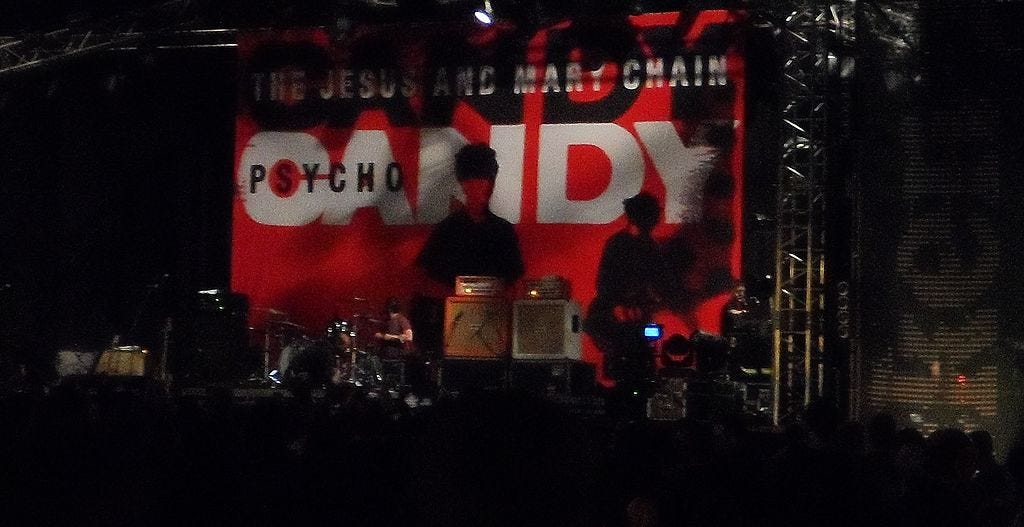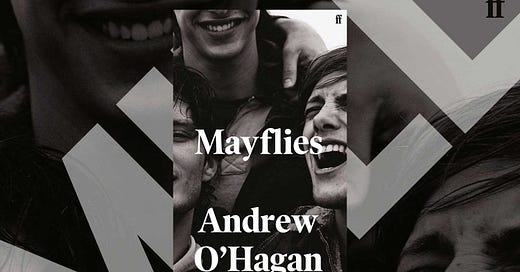I’m reposting this piece – written two years ago – not out of laziness, but evangelism. I adore this book, the thought of which is right now soliciting bashful weeping. It is the only book I can think of that has inspired my hands to shake, and today it still occupies a cherished place in my head. A two-part TV series was recently made, but so frightened am I of it somehow insulting the book that I have avoided it. Perhaps it’s good; certainly it cannot be better. (A fresh cut of Rickenslacker will be out this weekend.)
A few years ago, I asked Liam Gallagher if his best was behind him – he was nearing 50, and canonical albums are, amazingly, almost always produced by artists in their twenties.1
Liam typically speaks in streams of profane non-sequiturs, but his response to this presumptuous question was surprisingly coherent and admirably lacking in defensiveness.
“You’re still hungry now, you still want to fucking make great music and it’s still as important,” he said. “It’s like an actor, innit. You know what I mean? A lot of people turn around and go, ‘Oh, they only get good roles when they’re young.’ You look at some great actors, and there’s some fucking great actors that are older. And there’s some great parts for older actors. When you’re young, you’ve got no fear. You probably living at your mam’s or renting some shitty house and you’ve got no kids maybe, and you haven’t got a fucking clue, you only know what’s in front of your nose, but you’re thinking big, you know what I mean? So, yeah – you can do some great work. But you can equally do good work when you’re older, too. Look, there’s a lot of shit albums put out by a lot of young people as well.”
I was being polite. Liam Gallagher’s best work is obviously behind him, and there’s no shame in that – his best work has powerfully survived his decline. But judging Liam’s music was far less interesting than knowing if he was ever captive to the past, and I asked him if he was nostalgic for the summit of his fame and power and electricity, which was quickly and deliriously reached 25 years ago.
“I fucking love the past, the past was fucking great,” he said. “But I don’t sit there and, you know… I wear the same clothes as what I used to wear in the past, so maybe I am still in the past. As you get older you think about the days when we weren’t famous, or in a band, and you were messing about with your mates in the park playing football. They’re nice thoughts to have. [But] I kinda think about the now. Not the future. I live in the now.”
I asked because I was interested in the personal effects of fame, and how nostalgia might work itself upon an individual in the strange position of defining it for so many others. But Liam shrugged the questions off and gave the impression that his fame was destined – as natural as the weather.
I was thinking about all of this again after recently finishing Andrew O’Hagan’s novel Mayflies. It rightly annoys writers when critics assume their novels to be thinly disguised memoirs – as if acts of imagination are always strictly dependent upon personal experience – but in O’Hagan’s case, it stands. Mayflies is effectively a memoir, and we know this because the author’s told us.
The book is made of two halves. The first is contained to the British summer of 1986, and concerns the adventures of six working-class Ayrshire lads, bright and voluble and self-consciously defined by their music tastes (the British post-punk and indie of The Jesus & Mary Chain, Shop Assistants, The Fall, and – holier than all others – The Smiths). Unemployment is high, the miners are on strike and Thatcher is conspicuously despised, when the boys make their southern pilgrimage by bus to a Manchester music festival and the city’s famed Hacienda club.
They were living at their mam’s, or renting a shitty house, and they had no kids. They were unemployed, or working in factories, or, in the narrator’s case, vexingly employed by the local dole office. Some were dreaming big; others weren’t sure how to. Some parents were around, some gone – some were physically there, but bitterly aloof. Together they plot, chain-smoke and banter with preposterous articulacy.
They are unmistakably alive, ecstatic with their own passions and camaraderie, and their obnoxiousness is inseparable from their vitality. In every moment they’re together, something happens – some minor revelation of love or courage. They’re intensely, instinctively generous, and when they’re together everything seems possible – everything except a clear image of their future.
And Christ, how this resonated. The youthful importance of music, of words, of ambitiously straining to leave the orbit of family history. Never again will I play an Oasis B-side on the jukebox of a fish-and-chip shop, leap on the table and implore the bemused customers to accept Dionysus as their saviour. Nor will I again pull a woman from subway tracks two minutes before the train’s advertised arrival, then spend an hour and a half with her on that same train, shivering with shock, but too concerned to leave her. Never again will I inspire an improvised house party of punks and cabbies, nor be jumped by a pack of US marines for aggressively defending the legacy of George Harrison.
Was I silly, self-absorbed, grandiose? Emphatically so, and nicely shielded from that fact by immaturity, but there was also a generous and spark-making spirit that I subtly mourn these days. With that spirit I made nothing except long-forgotten moments – but Andrew O’Hagan made a richly defining friendship from it, and I like to think that others have made some of our greatest albums from it.

I’m not poisoned by nostalgia, and – more importantly – nor is O’Hagan. Mayflies’ climactic summer of ’86 is also touched by fear and sadness, by sick parents and uncertain futures. His mates’ vitality flows from nervous defiance, just as much as it does from their instinctive generosity and wit.
Lesser writers would have succumbed to the mawkish gravity of those days, and described the vitality without despair, the dreams without anxiety. O’Hagan doesn’t. Nor does he romanticise the Scottish working class, as when Jimmy describes his local pub’s casual ostracism of a black patron. “Tully had unearthed an irony: they were victims, these veterans of the fight against Thatcher, but he was the first person I knew, and perhaps the only one, who saw they could also be victimisers. Tully understood that difficult things did not cancel out other difficult things.”
But Mayflies is a book of two halves, and, like Oasis, its sum is greater than its parts. In the first, O’Hagan gives us a lovingly detailed portrait of a time and a place – but principally of a life-changing friendship with the unusually charismatic Tully: “He wasn’t so much the butterfly, as the air on which it travels.”
The second half of the book begins 30 years later, when Jimmy gets a call from Tully: he’s terminal.
Here is adulthood: upholding an old friend’s wish for euthanasia, despite the profound objections of Tully’s partner. Jimmy – O’Hagan – is jammed between them, and his pain is knowing that both arguments are legitimate, but that he can only honour one.
The second half of Mayflies is almost unbearable in its specificity: a nauseous and emaciated Tully playing a final gig; an angry and accusatory call from Tully’s wife; the Havana rum shared in the euthanasia clinic after the last forms are signed. One of the late scenes, of an opulent dinner in Zurich the night before “the appointment”, prompted faint trembling in my hands.
The novel’s unflinching focus and its plainness of prose seems almost heroic given the enemies arrayed against these virtues: horror, sadness and sentimentality could easily have produced bathos, or a less courageous gaze. Jimmy often remarks upon Tully’s bravery, but some of it has obviously rubbed off on his writer mate.
“Maybe someday you’ll write a book about us,” Tully says towards the end, and I’m so thankful that he did. For O’Hagan, if not for myself, the spiky glamour of his youth has been replaced by wisdom and a wondrously realised talent.
[O’Hagan has made a Mayflies playlist. And so have I.]
I happily concede the subjectiveness – nay, arbitrariness – of this, but let me offer just three of my favourite Big Albums: Revolver (Lennon was 26, McCartney 24), Astral Weeks (Van Morrison was 23), and Illmatic (Nas was just 20). Recently, and presumably in a late grab for relevance, Rolling Stone re-released their 500 Greatest Songs of All Time – four of the top five were all written and/or performed by people in their twenties. Sam Cooke was the mild outlier, at 33.






nice. 'poisoned by nostalgia' is an interesting idea.
That lede is a FLEX!